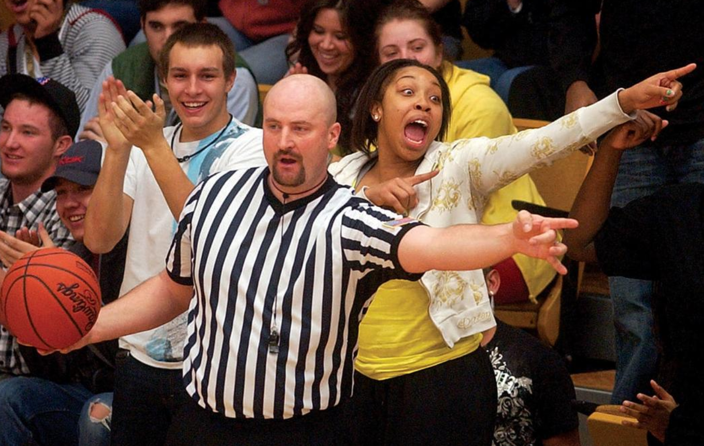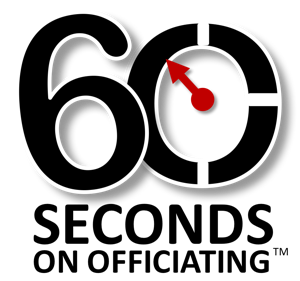
The Escalating Assault on Sportsmanship
As we wade deeper into the scholastic basketball postseason and ready ourselves for the college hoops showcase, REF 60 takes a moment to examine the madness that is marching perhaps steadily to its demise with the escalating unsportsmanlike behavior that is taking place in all athletic competition with alarming frequency
The Escalating Assault On Sportsmanship
President George W. Bush noted that civility is not a tactic or a sentiment. It is a determined choice of trust over cynicism; of community over chaos.
In our world of competitive athletics, civility wears the moniker of ‘sportsmanship,’ and sadly the choice of good temperament that our 43rd Commander-in-Chief referred to, has quite often been an option summarily dismissed in favor of an aggressive expression of one’s feelings by players, coaches, and fans.
And the primary target of this coarsening discourse has been the officials charged with the rewarding, but thankless responsibility of managing every game to allow the players’ skills and the coaches’ strategies to compete fairly and decide the outcome of each contest.
The escalating incidents of shocking unsportsmanlike behavior that are chronicled regularly on social media, local news coverage and Referee Magazine are the “canary in the coal mine” warning that the imminent danger to the future of scholastic athletics is real and needs to be addressed immediately.
According to a survey by the National Association of Sports Officials (NASO), more than 75 percent of high school refs say berating parents, aggressive coaches and the like are the primary reason that good men and women walk away from officiating. And a staggering 80% of all young officials leave their respective sport after just two years because of the abuse from fans and coaches.
And the combination of young people avoiding the avocation of officiating or quickly abandoning the fraternity, and having more officials over the age of 60 than under the age of 30, is a formula for disaster.
Now perhaps the real solution to the root of the problem is above the pay grade of officials. But game managers can certainly do their part to help prevent explosive incidents from erupting by being physically and mentally ready (maintaining a level of fitness that allows you to keep up with the flow of the game and have a clear understanding of the rules!), and maintaining the proper demeanor when tense situations do arise.
Our mission statement at REF 60 has long been to provide small, steady doses of relevant educational content to improve an official’s skill level and to enhance their overall experience with the craft. And part of the enhanced experience component is to help keep officials safe, and to offer sound advice on what they should do if they find themselves in a threatening situation.
To that end, REF 60 sought out the respected legal counsel of Mr. Alan Goldberger, a nationally recognized attorney on sports law and sports officiating.
Silence Is Golden
“Officials need to be conscious of avoiding getting into any kind of discussion with anyone who is not directly involved in the game,” said Goldberger who is a former football official, basketball referee and baseball umpire. “Such behaviors are risky, as explained below, and nor are we accountable to those people.”
“There are officials,” Goldberger states, “who like to talk with fans or answer questions during a break in the action, or worse yet, respond to a cutting remark directed to them or a member of their crew. And this type of interaction invites a lot of the difficulty we have. Not, by any means all of it, but enough to remove it as part of your officiating demeanor.”
“But the first thing we have to know is how to control ourselves.”
– Alan Goldberger, Esq.
“The one thing we never want to do,” cautioned Goldberger, “is to elevate the status of a spectator to be our peer by having some kind of dialogue with them. A fan’s only qualification for being at a game is their ability to pay the price of admission. Officials, on the other hand, have been trained and tested, and have been selected to be at the game. Do not give a fan the credibility of engaging them in conversation.”
So by avoiding any interaction with spectators, and limiting your conversation with coaches and players to concise comments to specific questions or situations, you will create your own artificial protective barrier.
And like all safety precautions when it comes to escape plans, knowing what you’re going to do beforehand is critical to your survival.
Goldberger’s Golden Rules
- When you arrive, seek out the site manager and ask where they will be during the game should you have an issue.
- Confirm with the site manager who will be the person to let you back in the dressing area at halftime and at the end of the game.
- Know your exit route from the court at halftime and end of the game.
- At the end of game buzzer, remove your whistle from around your neck, find your partner, make sure you have approved the final score, and then hustle off the court. Your movement should be a straight path to the gym exit and your peripheral vision should be wide to spot anyone looking to give you a piece of their mind, or more.
You must have the courage to do what needs to be done.
As to confrontations between two players, all officials need to react quickly.
“It’s been proven over and over,” states Goldberger, “that the best way to manage a fight is not to have one. Concentration and the ability to move quickly and decisively will carry the day. “When an official makes his or her presence known by interceding immediately, the would-be combatants are afforded the opportunity to “back off” instead of taking a swing at each other.”
Goldberger points out that most players do not want to fight and quick intervention preserves the dignity of the players and the safety of everyone in the gym.
“Competent officials do not, ‘stand back and take numbers’ Goldberger said. “Instead the momentary anger of players is displaced by the sight, actions, and words spoken by the “stripes.” The result is often – but not always: Fight prevented. Ejection prevented. Game saved. And, if the fists do fly anyway, you will be in good position to call the fouls indicated and restore order. The alternative, ‘deer in the headlights’ mechanic, simply does not work.”
However make no mistake; in the post-game ‘autopsy’ an official’s actions in the moments leading up to, during, and after the scuffle will undoubtedly be closely examined.
And in this video dissection (no matter how insignificant the game, there will be a video that surfaces!) is where officials will be challenged and second-guessed as to whether they exercised the requisite measure of authority (i.e. assessing personal, intentional, flagrant, or technical fouls) that would have doused this unsportsmanlike flame before it became a raging inferno.
Because rest assured when things go bad, the coaches, players, spectators, and administrators will be looking to minimize their culpability, which will serve to maximize the official’s liability.
And if officials do not exhibit the courage to penalize unsporting conduct, or do not have the awareness to sense the tension and tempers that are building, it is only a matter of time before they find themselves as Exhibit A in a cautionary tale on what NOT TO DO when it comes to an official handling their business.
The Sounds of Violence
Goldberger’s companion piece of legal advice for officials that goes with not elevating a spectator to their level is for a referee to never stoop to the depths of the fan’s crass behavior.
A spectator, who verbally threatens and/or confronts an official with a menacing presence that is meant to intimidate the referee, can be charged with assault. An added criminal charge of ‘battery’ would be added if the overzealous fan made physical contact with the official.
Laws are already on the books in many states to impose severe penalties for anyone who chooses extreme measures to express their displeasure with the work of an official.
“In every state laws prohibit assault and battery on anyone,” stated Goldberger, “referee or not. The key here is not to turn an assault by some boorish miscreant into a ‘barroom brawl’ scenario by striking back, or speaking angry words.”
Goldberger advises officials who find themselves in this unfortunate situation to seek out medical help, if needed, and legal help immediately.
“If an official finds themselves in a hostile environment their mindset should be to, ‘keep quiet and keep moving,’” counseled Goldberger. “The official’s sole focus should be to get to safety and then document the incident in detail. An official responding verbally or physically to the taunts or jabs of an angry spectator runs the risk of mitigating the criminal actions of the aggressive spectator and bolsters the defense’s position that the official bears some responsibility for the escalation of this unfortunate incident.”
Basketball, like all sports, is a perfect game that is played, coached and officiated by imperfect people. Referees miss calls, just as players miss layups, miss free throws and mess up defensive assignments, and coaches make terrible in-game strategic decisions.
These three groups come together to work in concert to perform their respective tasks, but only one has their mistakes viewed as purposeful and are often subjected to hostile retribution.
The time has come to banish the “KILL THE UMP!” and “REF YOU SUCK!” mentality from all scholastic sports. The permissive attitude that allows this aggressive behavior against sports official must come to an end.
Referees are the servants of the game who make it possible for players to play, coaches to coach, and spectators to spectate. Without officials, there can be no unbiased monitoring of competitive play and this obnoxious behavior is tantamount to the old adage of, ‘cutting your nose off to spite your face.’
Now, this call for civility in sports is not a naïve daydream. Civility, as former President Bush stated, is a determined choice.
Officials have a reason for optimism with this lofty goal of restrained criticism and even respect for their efforts. We need only to examine the seemingly overnight seismic shift in accountability for one’s action in the ugly area of institutional sexual abuse of children and the open secret of sexual harassment of women in the workplace.
And the same profound changes can occur in the areas of youth and scholastic athletic competition.
A clearly stated and consistently enforced reasonable code of conduct with officials, school administrators, coaches, players, and spectators/parents working their “primary coverage areas” to bring about the dawn of a new day in sports can be the new normal.
Civility – it can be in the lineup for every game if we work to make it so!
A special thanks to Alan Goldberger for his contribution to this REF 60 post. Mr. Goldberger is a member of the New Jersey, New York and Maryland Bars. A former three-sport official, he is the author of “Sports Officiating: A Legal Guide.”
Mr. Goldberger counsels clients nationwide in sports industry and athletic risk management and liability defense, business-related disputes, administrative hearings and contractual relations. He has been a featured speaker at numerous national conferences.
For more information or to contact Alan Goldberger visit, www.RefLaw.com
Photo courtesy of Magic Valley Times News
